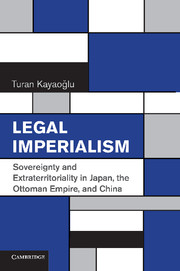Book contents
- Frontmatter
- Contents
- Tables and Figures
- Acknowledgments
- Introduction: Extraterritoriality in British Legal Imperialism
- 1 Positive Law and Sovereignty
- 2 Extraterritoriality and Legal Imperialism
- 3 Japan's Rapid Rise to Sovereignty
- 4 The Ottoman Empire's Elusive Dream of Sovereignty
- 5 China's Struggle for Sovereignty
- Conclusion: American Legal Imperialism – Extraterritoriality Today
- Bibliography
- Index
4 - The Ottoman Empire's Elusive Dream of Sovereignty
Published online by Cambridge University Press: 25 May 2010
- Frontmatter
- Contents
- Tables and Figures
- Acknowledgments
- Introduction: Extraterritoriality in British Legal Imperialism
- 1 Positive Law and Sovereignty
- 2 Extraterritoriality and Legal Imperialism
- 3 Japan's Rapid Rise to Sovereignty
- 4 The Ottoman Empire's Elusive Dream of Sovereignty
- 5 China's Struggle for Sovereignty
- Conclusion: American Legal Imperialism – Extraterritoriality Today
- Bibliography
- Index
Summary
Territorial sovereignty was an elusive dream of Ottoman rulers: From the 1856 Paris Conference to 1914, Western states continuously refused numerous Ottoman pleas to end extraterritoriality. The last rejection so frustrated the Ottoman government that they resorted to a policy option that the Japanese government never attempted. The Ottomans gave a memorandum to the extraterritorial powers on September 9, 1914, notifying these powers that extraterritoriality was to be abolished effective October 1, 1914 – a month before the Ottoman Empire declared war on the Allies. The Ottoman memorandum stressed the incompatibility of extraterritoriality with territorial jurisdiction and national sovereignty. The memorandum further enumerated the injustices and humiliation suffered by the Ottoman Empire because of extraterritoriality. The Allies, Austria, and Germany rejected the Ottoman unilateral abolition. It was not until 1917 that Austria and Germany accepted the abolition of extraterritoriality in the Ottoman Empire. It would take the Allies several more years; the Lausanne Treaty – the last peace treaty of the First World War – finally ended the extraterritoriality rights of the Allies in 1923.
Similar to discussions in Japan and China, the debates and negotiations about sovereignty and extraterritoriality in the Ottoman Empire/ Turkey focused on the Ottoman Empire's legal system. Apart from this similarity, however, the Turkish case offers novel insights about the relationship between sovereignty, extraterritoriality, international society, and domestic legalization. Earlier incarnations of extraterritoriality (under the rubric of capitulations) were developed within Ottoman-European relations; later, Western states reproduced these unequal extraterritorial relations in their encounters with other non-Western states, including China and Japan.
- Type
- Chapter
- Information
- Legal ImperialismSovereignty and Extraterritoriality in Japan, the Ottoman Empire, and China, pp. 104 - 148Publisher: Cambridge University PressPrint publication year: 2010
- 1
- Cited by



